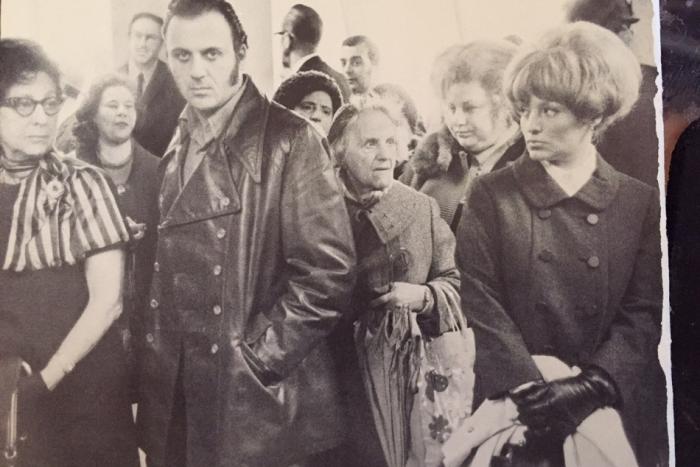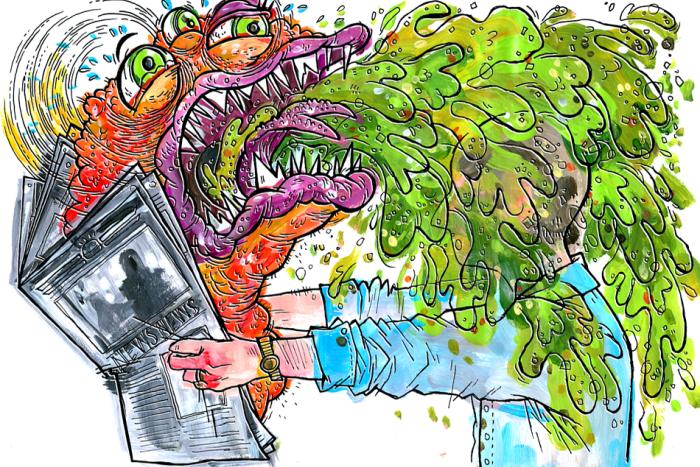Read Scaachi's first letter to Alex.
Scaachi!
First of all, happy July 4th! I would’ve written sooner, but I’ve been busy celebrating the biggest difference between our two great nations (besides a pathological love for mayonnaise and the letter “u”): the fact that we refused to live under the pallid and foppish crumpet of British tyranny. I spent the weekend in a haze of barbecues, beaches, and beer. Procrastinating was my patriotic duty.
There’s another reason for the delay though, one I can’t chalk up to love of country: shame. More than any other book I can think of, To Kill A Mockingbird just seems like a book you’ve read before and I refused to believe that I had not read it. So I conducted my own, low-rent production of Rashomon.
I turned to kin first. I assumed my Virginia-bred father had read it to me but, when prodded, he confessed that he had, in fact, never read it himself. My mother thought I had read it, but, after discussing it for a few minutes, they decided that we had only seen the movie and yes, isn’t Gregory Peck terrific? I’m the only child of two only children—a fact that is essentially the Rosetta Stone of my personality—and have no living grandparents, so I had to turn elsewhere.
You’re right that there’s a dark, horrible, unspeakable Event at the center of every publishing career. Publishing is the ideal path for self-flagellaters, for those who seek to be perpetually underpaid, overworked, and underappreciated—it’s like being a monk but with more drinking and less sex. But I’ve done an excellent job of repressing whatever led me down this cursed path.
Our upbringings will probably be unavoidable as we write more about books like To Kill A Mockingbird—books that are either welded to syllabi or come with the various identity kits that kids in middle and high school try on (I’m looking at you, On The Road)—but for now I’ll keep things short and sweet and just say I had lots of friends growing up, thank you very much, and still do! (High five.)
Anyways, I polled four of those friends (did I mention I was surprisingly popular?) and didn’t get anything conclusive. Three thought we read it in middle or high school, but couldn’t remember actually reading it; a fourth thought we hadn’t but couldn’t remember not reading it either. At this point, I should have realized I was just procrastinating, or worse, conducting a useless experiment for the purpose of anecdotal exposition, but I held onto the belief that I had read To Kill A Mockingbird for a surprisingly long time.
That may partly be because it’s somehow resisted becoming a book that’s only read in school, like A Separate Peace or its Canadian equivalent Tim Horton’s Daughter. It’s probably the only book I can think of that I would assume another person, selected at random, had read. It seemed inconceivable that I couldn’t have read it because it just seems like a book that everyone has read. But I had not read To Kill A Mockingbird until a few short days ago.
Which is all a very long walk to say that we agree about a lot when it comes to this book but that the most banal difference in our experience—the fact that you read To Kill A Mockingbird as a child and I read it as an adult—is fascinating to me. Of course, emphasizing that difference while sidelining (for now, at least) the fact that I am white and male and American and you are brown and female and Canadian is the whitest, malest—and, hell, probably most American—thing I can do, especially during a conversation about what is arguably the most important American novel about race. (While we’re on the subject, being white is great, except when shit like this happens.)
My biggest regret about not reading To Kill A Mockingbird sooner is having to wait this long to have Scout, the patron saint of know-it-alls, of those who see your bullshit and will call you out on it, in my life sooner. Scout fucking rules. Too often, “tomboyishness” is presented as coming from a place of weakness—it emerges from a lack of acceptance from other girls or is seen as imitative, rather than self-actualizing. Scout’s tomboyishness comes from a place of strength: she’s operating under the certainty that she is right and the boy she’s going to beat up is so wrong that he completely deserves the hellfire that’s coming his way. She has the right mix of performativity and white-hot righteousness—call her a proto-misandrist.
So I totally get the fact that you loved Scout—how could you not? You were Scout, just North of the Wall. (From my vantage point, at least, you still are—at least on the Internet.) But in your letter you raise really interesting questions about that love when you wonder if the real estate occupied in your brain by Scout is proof that you “missed the point” that this is a novel about race and racism, not the exploits of Girl Huck Finn (But Better), literature’s most archetypal big brother, and their friend, the Dictionary Definition of Doofus, (with a late, show-stealing cameo from Creepy Neighbor Ex Machina).
Sorry. That was maybe the dumbest possible way to summarize your very sharp question. Take two: Who is this book really about—the black man whose trial marks the novel’s third (and best) act, or the white family of the man defending him? Why do we remember Scout and Atticus and Boo, but not Tom?
My biggest regret about not reading To Kill A Mockingbird sooner is having to wait this long to have Scout, the patron saint of know-it-alls, of those who see your bullshit and will call you out on it, in my life sooner.
As I worked my way through the book, I kept asking those questions. For a while, I was simply befuddled. I had gone in expecting a novel structurally and thematically shaped around the topic of race, but what I encountered was something altogether different: to me, To Kill A Mockingbird is a book about a little girl and her brother who are certain the world works one way only to discover that it doesn’t work that way at all. It’s a coming-of-age story, in other words.
For over half of the book, Scout beats up boys and scares herself silly and thinks the world she lives in makes sense and is fair. Lee makes it clear that Maycomb’s divisions—its racial divisions, yes, but also its class structure—are deeply entrenched; Scout, like many other residents, clearly sees them as being permanent—fairness is out of the question because the way things are is the way things have always been. Everything in its right place. (Well, maybe not everything—Scout intuitively recognizes and rejects misogyny.) Both Scout and Jem embody the particular idealism of children in distinct ways—that burning sense of right and wrong, of how things should work. That idealism consistently comes into conflict with the messiness of the world around them, but they’re resilient and secure—until Tom’s trial upends that sense of certainty, that sense of security.
Yes, To Kill A Mockingbird illustrates the destructive power and unbearable immorality of institutionalized racism powerfully and simply—what happens to Tom is obviously and unimpeachably wrong. Only a white audience would need the existence of institutionalized racism explained to them by a child and a wise, aloof lawyer, but Scout and Atticus do as good a job as anyone. It could be argued that part of To Kill A Mockingbird’s persistent appeal is that Scout’s simultaneous recognition of Tom’s humanity and rejection of the structures denying that humanity are a kind of allegory for some readers—that it mirrors a larger awakening.
Those are cynical readings, but they speak to the fear that’s gnawed at me since I finished reading: that the reason we tend to forget about Tom is that he’s more of a device than a human, that his only (ironic) purpose in the novel is to change Scout and Jem’s worldview, that he dies so she can finally see just how unfair the world is. I don’t know how much Tom’s trial or his death have to say about structural racism—and I fear that they don’t say much—but they do vividly and powerfully illustrate the reality of it.
That said, I think there’s more nuance to be found outside of the courtroom. While Tom’s trial is clearly and rightfully presented as a travesty, the world outside the courtroom is far more complicated. After Tom’s trial, it becomes clear that what Scout once perceived as the natural order is actually the result of centuries of structural oppression.
This speaks to my favorite part of the book: the tacit acknowledgment that recognizing oppression and unfairness isn’t enough. If To Kill A Mockingbird is a book about children learning that the world is unfair and unjust, it’s also a book that asks how we live in and respond to a world that is unfair and unjust. The classic Sunday School question, “Why do bad things happen to good people?” as courtroom drama.
That’s not to say that there aren’t models available. Atticus’s combination of resignation and resilience is clearly presented as the best possible alternative: when faced with unfairness, you fight for what’s right; when you lose, you lick your wounds and get ready to fight again. Atticus holds onto enough idealism—his faith in the courts is admirable, if a bit old-fashioned—to fight another day. Call it fatalistic pragmatism.
That’s an honorable path, but Lee struggles to contain the sense of despair that often emerges in the second half of To Kill A Mockingbird. For me, the most moving part of the book was when Gem tells Scout, “I think I’m beginning to understand why Boo Radley stayed shut up in the house all this time… it’s because he wants to stay inside.” A far cry from Atticus’s “Give me 12 Good Men In The Box” philosophy.
Of course, Boo Radley does eventually come outside, in a moment that (I think) is supposed to offer a kind of redemption: here is proof that there is still good in the world, that noble acts can come from unexpected places. To me, though, it felt tacked on and weirdly incongruous—a move that resolved the novel’s plot while upsetting some of its thematic development. Maybe I’m just too old to get Boo Radley.
That got kind of dark! Sorry—the book took me in abstract directions that I didn’t expect and haven’t quite fully processed yet. They’ll be more jokes in the next one. Promise.
Alex
(So help me god, if there’s one extraneous u in my post I’ll be on the next plane to Canada and I will make you pay.)






